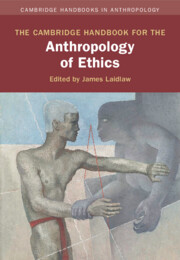Book contents
- The Cambridge Handbook for the Anthropology of Ethics
- Cambridge Handbooks in Anthropology
- The Cambridge Handbook for the Anthropology of Ethics
- Copyright page
- Contents
- Contributors
- 1 Introduction
- Part I Intellectual Sources and Disciplinary Engagements
- Part II Aspects of Ethical Agency
- 9 Making the Ethical in Social Interaction
- 10 Freedom
- 11 Responsibility
- 12 Emotion and Affect
- 13 Happiness and Well-Being
- 14 Suffering and Sympathy
- 15 Ambiguity and Difference
- Part III Media and Modes of Ethical Practice
- Part IV Intimate and Everyday Life
- Part V Institutional Life
- Index
- References
13 - Happiness and Well-Being
from Part II - Aspects of Ethical Agency
Published online by Cambridge University Press: 11 May 2023
- The Cambridge Handbook for the Anthropology of Ethics
- Cambridge Handbooks in Anthropology
- The Cambridge Handbook for the Anthropology of Ethics
- Copyright page
- Contents
- Contributors
- 1 Introduction
- Part I Intellectual Sources and Disciplinary Engagements
- Part II Aspects of Ethical Agency
- 9 Making the Ethical in Social Interaction
- 10 Freedom
- 11 Responsibility
- 12 Emotion and Affect
- 13 Happiness and Well-Being
- 14 Suffering and Sympathy
- 15 Ambiguity and Difference
- Part III Media and Modes of Ethical Practice
- Part IV Intimate and Everyday Life
- Part V Institutional Life
- Index
- References
Summary
Since the late 1990s, anthropologists have increasingly turned their attention to ‘happiness’ and ‘well-being’, a field of study long dominated by moral philosophers, social psychologists, and welfare economists. This chapter reviews anthropological approaches to happiness and well-being, and their engagement with ideas from virtue ethics, value theory, and capabilities approaches to development. Across a range of ethnographic cases in which the concepts have been applied as well as from which analogous concepts have been drawn, we highlight the analytical tension between (a) a search for objective measures that can be used to guide efforts aimed at increasing well-being and reducing global inequities and (b) the exploration of cultural worlds in which different peoples conceive of and pursue ‘the good life’ in varied and sometimes incommensurate ways. This multidisciplinary analytical field has been productive for anthropological theory, but scepticism remains around the implications of its evaluative impulses and ambitions.
Keywords
- Type
- Chapter
- Information
- The Cambridge Handbook for the Anthropology of Ethics , pp. 335 - 358Publisher: Cambridge University PressPrint publication year: 2023



